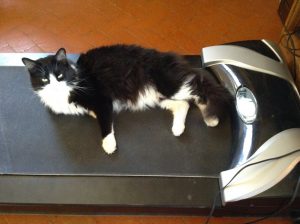I mentioned on my podcast – First Cup of Coffee with Jeffe Kennedy – just about two weeks ago, that I’d read this very interesting article on how starting the day by looking at the internet changes how your brain functions. The author specifies going for three hours before looking at the internet, which I realize not everyone can do. Many people start their jobs within three hours of waking up and those jobs may specifically require checking email or company social media.
But for many of us… do we HAVE to look at those things within three hours of waking?
And I’m not saying it has to be like this author frames it. Not everyone has the luxury of spending the first three hours of the day meditating, quietly reading, or journaling. Sure, it sounds lovely in theory, but most of us don’t lead monastic lives. I don’t think it’s necessary anyway.
If a person, say, wakes up at 6 am, does the grooming/hygiene thing, maybe eats breakfast or has a hot beverage, could be getting other people ready for their days, perhaps some exercise, likely a commute to the job, then settling in – that’s usually about two hours, right? I mean, I know more than once in college I woke up at 7:30 and still made it to an 8 am class, but college students are not famed for their grooming, nutrition, or good planning. For someone a bit less subject to chaos and late nights than a college student, it seems that arranging a morning to allow for three hours before checking email and social media is entirely a possibility.
It would mean not checking email on the phone while sitting on the subway, and ignoring Twitter until later in the day. It means Facebook instant messages go unanswered for *gasp* maybe a whole twelve hours!! (Seriously – it pisses me off that Facebook tries to shame me by displaying how long it takes me to reply to messages on my author page, encouraging me to respond faster to earn some fucking badge like I care for their rewards. *ahem*) I’m not saying it’s easy to break this habit, especially when these internet companies are hugely invested in training us to look All The Time. I’ve turned off all of my notifications on my phone, and I can’t tell you how often they prompt, then try to command and trick me, to turn them back on. If they want that so badly, we have to know it’s not for OUR benefit.
I’ve been thinking a lot about the Time Before the Internet (TBI) and how different the flow of my attention was. And let me be clear: I love what the internet has brought to my life and to the world. Through social media and online groups, I have made many, many lasting friendships, kindred spirits I very likely would never have encountered otherwise. That’s a *huge* thing. As is the flow of information and sharing of important events. But, I’m not a fan of the way I’ve arranged my schedule, thinking, and life to accommodate the internet’s demands for attention.
One thing about the TBI, which closely predated cell phones (at least affordable ones normal people could actually carry around), was that no one expected us to be instantly available. I remember when email became widely used and my older boss commented that it used to be you’d send out a paper and could count on a week or two of it being off your plate before comments arrived in the mail. With email, that buffer time shortened to a day or two – or less. Now we have Facebook exhorting businesses to reply within an hour – or less. In some ways this decreased latency has helped productivity, but I can also see how it forces me into a responsive mode. If I let it, the internet could have me in a constant battle to respond to messages and notifications.
In that state, when I do produce work of my own?
So, I’ve been trying this. I wake up between 5 and 6 am, do the hygiene thing, feed the cats, exercise (which means some reading), record my podcast or write a blog post, and then I go straight to writing. This means I can’t post the podcast or blog to social media until later in the day, but oh well. Does it really matter what time those things post? I don’t think so.
The result has been astonishing. I’ve been getting my 3,000 words done before noon most days. Then, when I’m done and switch over to business, I get through email much more efficiently than before. I go from one task to the next: post my stuff, answer emails, reply to Facebook messages, reply to tweets. Work on other business.
People: I can feel the difference in my brain. My concentration is vastly improved. The book is flowing well. And when I do face the business tasks, those much-dreaded tasks that tend to slide down my To-Do List are actually getting done.
Highly recommend trying this, however you can make it work. No monastic existence necessary
.






